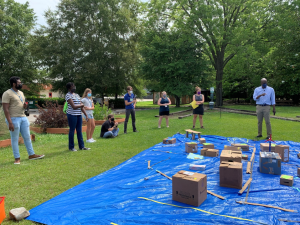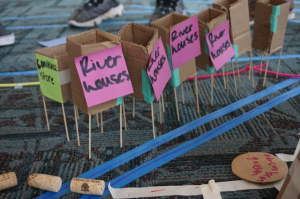YES-Resilience youth science enrichment program wraps up with in-person summer institutes
August 1, 2021The UNC Institute for the Environment’s Center for Public Engagement with Science (CPES) concluded its 10-month-long science enrichment program, Youth Engaging in the Science of Resilience in Urban and Rural NC (YES-Resilience) Teen Climate Ambassadors Program in June with two, in-person summer institutes.
The institutes took place at the NC Museum of Natural Sciences (NCMNS) locations in Whiteville and Raleigh, culminating in what had been an entirely virtual program to date. Both the youth participants and the science education team, which included Dana Haine, the CPES K-12 science education manager, and Sarah Yelton, the CPES environmental education and citizen science program manager, were excited to have in-person activities.
Haine and Yelton, in partnership with NCMNS educators Hannah Barg and Taylor Lackey, designed two, three-day institutes to enable the youth ambassadors to meaningfully interact and apply all they had learned about climate resilience during the program.
“At the same time as we are implementing this exciting program, NSF is supporting us to conduct research to discover how the program affects participants’ knowledge and skills and whether they take action in their communities as a result. This information will help us understand how we can support youth in putting their knowledge about climate change into action,” said Kathleen Gray, principal investigator and director of the Institute for the Environment’s Center for Public Engagement with Science and associate director for Outreach and Public Service.
A substantial portion of the institute was devoted to building and refining a cardboard model of a resilient community and sharing their model with community stakeholders such as Brian Byfield, resilient communities program manager for the NC Office of Recovery and Resiliency.

Virtual programming from August 2020-May 2021 invited youth to learn about climate impacts relevant to North Carolina such as sea-level rise, extreme heat, extreme precipitation and flooding and to explore and evaluate relevant solutions that promote climate resilience.
To learn about climate resilience to these impacts, youth were guided through the “Steps to Resilience” outlined in the US Climate Resilience Toolkit, a 5-step process that entails identifying climate hazards, assessing who is most at risk and vulnerable from these hazards, identifying, evaluating and enacting solutions that promote resilience.
“High school students hear about the climate crisis a lot,” said Lynn Cross, head of youth programs for NCMNS. “They are learning about it in school and hearing about the impacts through media outlets. Many of them are personally impacted by extreme weather events. The importance of this program is sharing strategies and technology that allow people to live with and hopefully mitigate the negative impacts of climate change. It is important to inspire hope about this topic and for students to hear positive messages and meet people from all backgrounds making changes, big and small.”
“We wanted to give students the skills to evaluate a range of solutions, while also recognizing that some solutions could be harmful to communities that are already vulnerable to climate change,” said Haine.
The program emphasized the importance of including the social element when evaluating climate resilience.
“In addition to learning about measures to mitigate and adapt to a changing climate, we also discussed measures to promote social cohesion in communities, including the value of engaging members of vulnerable groups in identifying and evaluating community-based solutions. Environmental justice, climate justice, and energy justice were all topics that we not only mentioned but emphasized,” said Haine.
For example, for their cardboard community challenge, youth were tasked with identifying a range of solutions to protect its most vulnerable residents during and in response to a climate event such as a heatwave or a flood. Not only are these events relevant to NC but most of the youth had personal experiences to bring to the activity.
“I enjoyed making the cardboard city the most,” one participant wrote in the online evaluation.
“It pulled together everything we have learned and interacted with over the course of the program. We were also allowed to work together for the first time in person,”
“Our intent throughout this program was to empower youth to learn about local climate impacts, learn about solutions, and take action in their communities through the design and implementation of resilience-focused action projects,” said Haine.
Students were inspired to plant trees and build pollinator gardens in their communities, among others. Participants showcased their projects in a celebration with parents and program staff at the conclusion of each institute.
“I hope students come away with a greater understanding of what climate change really looks like in our communities, and then a greater awareness of the solutions that communities can implement to deal with these impacts. And a greater awareness of the role that youth can have in these solutions,” Haine said.
“Although I spent time working with students from both the Whiteville and Raleigh cohorts of this program, I spent most of my time working closely with the Whiteville participants. If you have not been to Whiteville before, it is a small rural community located about an hour west of Wilmington, where activities for youth are few and far between and STEM programs for teens are almost unheard of,” added Lackey. “The time I’ve spent working with NCMNSW and on this program has shown me just how important opportunities like this are, especially for youth in rural areas. It gives them opportunities to explore climate change on a larger scale, shows them career opportunities that they might not have known existed, and gets them engaged with their communities.”
YES-Resilience is a pilot program supported by a $350,000 grant from the National Science Foundation’s Advancing Informal STEM Learning (AISL) program. Ultimately, this program will provide insight into how youth, including those who identify as belonging to groups underrepresented in STEM careers, learn and grow through participation in a climate education program anchored by a focus on helping youth become changemakers in their communities. This work will culminate in the development of a climate resilience curriculum for informal science learning environments and will include strategies for increasing the relevance of programming in both rural and urban areas.
By Allie Roberts and Dana Haine
This summer, Allie Roberts is serving as an intern for UNC-IE’s communications department, writing articles and conducting interviews for the monthly newsletter. She is a part of Appalachian State University’s English Professional Writing Program, class of 2022. Allie plans to complete her master’s in English Rhetoric and Composition in 2023 through an advanced program at App State.
Dana Brown Haine is the K-12 Science Education Manager for the Center for Public Engagement with Science. With a background in the biological sciences, Haine enjoys weaving her life science expertise into her passion for educating others on critical environmental science and health topics. Haine’s research translation and curriculum development skills enable her to deliver cutting-edge environmental science content and innovative activities to K-12 students, teachers and informal educators. Haine also contributes to the outreach efforts of the Community Engagement Core for the UNC Center for Environmental Health and Susceptibility in UNC’s Gillings School of Global Public Health. In her role as an environmental health educator, Haine shares scientific findings emerging from Center scientists with K-12 audiences and members of the general public.

